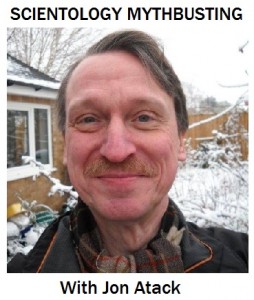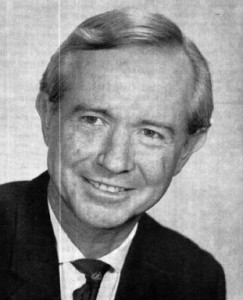This week, the media is buzzing about a woman who left the Church of Scientology after protesting the way it interrogates and discards people, and pits members against each other. Longtime Scientology watchers, however, know that these are not new concerns about the church. And Jon Atack makes that point by telling us what he went through when he left the church in 1984…
JON: I left Scientology because a close friend of mine was declared Suppressive. Well, actually, his name was put on a list — the formal declare took rather longer. According to strict policy, there must be a Committee of Evidence before a Suppressive Person declare is issued, but, as with many others, his name went on a list and that was that. A week before, his friend Peter Shantz, who was Ethics Officer at Saint Hill had called me in and said he was concerned that our mutual friend might be declared. He wanted my help to oppose this. A week later, he called me back in to tell me the deed had been done. I asked what we were going to do about this, and was told that suppressives can be very devious. His friend of over a decade was thrown to the sharks, because his name was on a list. That was all the evidence that Shantz needed.
I spent six months sending my inquiries ever further up line, and being stonewalled. When the new International Justice Chief failed to respond, I wrote a letter to Ron, which began, “I know that L. Ron Hubbard does not receive letters addressed to him, but this is the last recourse…” The reply read, “Of course I receive my letters!” but as to my request for a Committee of Evidence for my friend, the only response was “Your letter is on my desk.”
 For six months, my friend had refused to communicate with me, lest I be declared, too. I wrote and explained my six month journey to nowhere, and asked questions about senior management, of which he had been part. He pointed me towards two of his friends — Ron Hopkins and Jay Hurwitz — who were local to me and could explain how the Messengers had expelled most of the executives. Ron and Jay were both declared suppressives. They were also both charming and very helpful. Neither of them spat fire nor smelled of sulphur.
For six months, my friend had refused to communicate with me, lest I be declared, too. I wrote and explained my six month journey to nowhere, and asked questions about senior management, of which he had been part. He pointed me towards two of his friends — Ron Hopkins and Jay Hurwitz — who were local to me and could explain how the Messengers had expelled most of the executives. Ron and Jay were both declared suppressives. They were also both charming and very helpful. Neither of them spat fire nor smelled of sulphur.
I determined that I would seek out the SPs, and hear their side of the story. After all, I was OT, so I wasn’t worried about being overwhelmed by any SP! I wrote to Cyril Vosper, author of the bestselling The Mind Benders, which I had read (and dismissed) as a member of the cult. I said that we had taken Scientology out of the Church. He replied that he couldn’t imagine Scientology working outside the ‘fascist’ environment. Cyril visited, and we became good friends. He had joined in 1954, and lasted 14 years. He met Hubbard on many occasions. Scientology was a small business until the 1960s, when the Australian State of Victoria started its inquiry, and generated international publicity and interest. A number of people told me that it was accusations of black magic and the like, that attracted them to the cult.
Cyril was clever and witty. He was also self-deprecating in his humour, and, generally a compassionate man (unlike many Scientologists). If a body-router approached him, on Tottenham Court Road, Cyril would happily chat. Soon enough, he would say that he’d known Hubbard, and mischievously enjoy the awe this evoked. He would inevitably be asked for his strongest memory of the Great OT, and would say that most of all, he remembered Hubbard’s foul, stinking breath. Hubbard was afraid of dentists, so let the teeth rot in his head, Cyril would add.
I cast my net wider and found the whereabouts of the World’s First Real Clear — John McMaster. This would have been 1984, and John was living in a squalid apartment in London. I interviewed him for three hours. I remember that my first question was, “How did you get into Scientology?” and the answer began, “I was born in Durban,” and took about fifteen minutes. The next time I visited, John wanted to tape the interview for his own use, but mistakenly pressed his machine’s play button. I was surprised to hear, “I was born in Durban…” He had evidently rehearsed his answers in some detail. Add to this his theatrical enunciation (“I bring love to you, and you, and you,” which came from his lectures of two decades before). A friend interviewed him, too, and hour after hour, we got almost exactly the same words.
As a young man, John had suffered from stomach cancer and had most of his stomach removed. He was in constant pain, but then never again felt any pain in his stomach after his first auditing session. Before anyone starts boasting the fantastic effects of Scientology, it is worth pointing out that by the time I met him, he was destitute and lived on cheap wine and vodka. I never saw him eat anything, either, which was rather worrying.
John’s big secret was his homosexuality. Another of the first ten Clears (1960s style), explained to me his surprise that seven of the first ten were gay, a fact that he had often pondered, as Hubbard was well aware of this. John used to travel with his ‘secretary’ and was certainly the most successful public representative the cult has ever had (though he didn’t fare well as the cult’s rep to the UN). Many people told me how much they loved John, though not one of them had spent any time with him.
After our first meeting, I wrote to John to tell him about the Gay Theta Association. I received an incensed seven-page reply assuring me that John was most certainly not gay.
In his last few years, John was able to cash in on his celebrity in the independent movement. John had a great deal to say about ‘Tubby,’ as he called Hubbard. The gist was largely that Tubby was a very jealous man, who would seethe at the adulation John received. He was also upset that John got much better results as an auditor, doubtless because of his effusively friendly manner. Through the Fair Game period, John desperately tried to calm Tubby down, but to no effect. John protested that we should be able to communicate with SPs and that running away from them — disconnection — achieved nothing. Surely we could develop a technology to cure them, instead? Eventually, John found himself floating in the water with a broken collar bone, for three hours, and decided to do his drinking elsewhere.
For me it was the beginning of a long journey. I met over 500 ex-members while writing A Piece of Blue Sky, and read testimony, articles or books by about 150 more. According to Hubbard, SPs make up 1 in 40 of the general population, so it is strange that he chose to work almost exclusively with SPs. By the time Hubbard died, the only Hubbard-picked senior executive remaining — out of hundreds — was Norman Starkey. Everyone else from Dr Joe Winter and Don Rogers, who set up the first Dianetic Foundation, to Otto Roos and David Mayo, who had audited Hubbard, had gone. But then, the only true SP was Hubbard himself.
——————–
L. Ron Hubbard Settles The Ashtray Debate
On Tuesday, we raised some questions about Scientology’s “Training Routine 8,” which has participants shouting instructions at an ashtray. Scientologists are told to concentrate and get their “intention” over to the ashtray and get it to “stand up.” Scientologists will tell you that they don’t actually expect the ashtray to levitate on command.
But as in all cases with Scientology, it’s good to check with Source — founder L. Ron Hubbard. Listen to this short excerpt from a January 7, 1955 lecture that he gave, and the next time you consider TR-8, remember these words…
——————–
Posted by Tony Ortega on July 13, 2013 at 07:00
E-mail your tips and story ideas to tonyo94@gmail.com or follow us on Twitter. We post behind-the-scenes updates at our Facebook author page. Here at the Bunker we try to have a post up every morning at 7 AM Eastern (Noon GMT), and on some days we post an afternoon story at around 2 PM. After every new story we send out an alert to our e-mail list and our FB page.
If you’d like to help support The Underground Bunker, please e-mail our webmaster Scott Pilutik at BunkerFund@tonyortega.org







